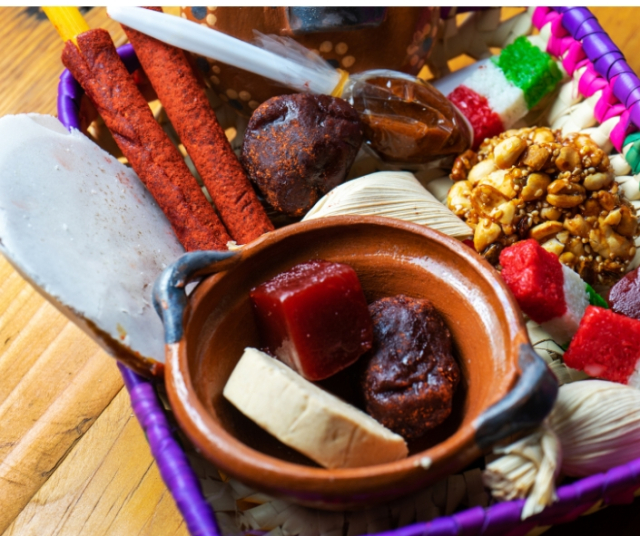Mexican sweets are a delicious and colorful expression of the rich culture and tradition of Mexico. These exquisite delicacies have been an integral part of the daily lives of Mexicans for centuries and continue to be an important element in celebrations and festivities throughout the country. With a wide variety of flavors, textures and colors, Mexican sweets offer a unique culinary experience that deserves to be explored in detail.
History of Mexican Sweets
The history of Mexican sweets dates back to pre-Hispanic times, when indigenous civilizations such as the Aztecs and the Mayans were already enjoying a wide range of sweets made from natural ingredients such as corn, honey and nuts. These sweets were used both as daily food and in religious ceremonies.
With the arrival of the Spanish to Mexico in the 16th century, a cultural and gastronomic exchange took place that led to the creation of new sweets. The Spanish introduced ingredients such as milk, sugar and almonds, which were incorporated into the local culinary tradition, giving rise to the appearance of sweets such as dulce de leche and turrón.
During the colonial era, Spanish nunneries played a fundamental role in the production of sweets. These nuns developed recipes that were passed down from generation to generation and became part of the Mexican sweet tradition. Some of the most famous sweets, such as camote, ate and cocada, have their roots in these convent recipes.
Variety of Flavors and Textures
One of the most outstanding characteristics of Mexican sweets is the incredible variety of flavors and textures they offer. From smooth and creamy sweets to crunchy and spicy sweets, there is something for everyone's tastes. Below are some of the most popular Mexican sweets and their distinctive characteristics:
1. Tamarinds
Tamarinds are one of the most emblematic flavors of Mexican cuisine. These sweets are made from tamarind pulp, which is mixed with sugar and molded into small balls or popsicles. They have a sweet and sour flavor and a spicy touch that makes them unique.
2. Joys
Alegrías are sweets made from amaranth, a grain that has been cultivated in Mexico since pre-Hispanic times. Amaranth is mixed with honey or sugar and molded into small tablets. These candies are nutritious and come in a variety of flavors, such as chocolate, pepita (pumpkin seed), and honey.
3. Marzipan
Marzipans are sweets made from ground almonds and sugar. They have a soft, crumbly texture that melts in your mouth. Marzipans are especially popular during holidays, such as Day of the Dead.
4. Cocadas
Cocadas are sweets made from grated coconut mixed with sugar and condensed milk. They come in a variety of colors and flavors, from traditional coconut to pineapple and guava. Cocadas are a true feast for coconut lovers.
5. Candy Pops
Candy lollipops are a childhood classic in Mexico. These popsicles are made by boiling sugar and other ingredients until caramelized and then molded into a popsicle. They come in a wide range of flavors, from cajeta to chili.
6. Dulce de Leche
Dulce de leche is a smooth, creamy treat made by cooking milk with sugar until it caramelizes. It is used in a variety of Mexican desserts, such as flans and chocoflan.
7. Tie
Ate is a thick and gelatinous fruit candy made with fruits such as guava, quince or tejocote. It has an intense flavor and is cut into squares that are usually wrapped in colored paper.
8. Cajeta
Cajeta is a sweet similar to dulce de leche, but it is made by cooking goat's milk with sugar. It has a deeper flavor and a slight touch of caramel.
Celebrations and Mexican Sweets
Mexican sweets play a central role in many of the celebrations and festivities that take place throughout the year. Some of the most notable events in which sweets are protagonists include:
1. Day of the Dead
Day of the Dead is a Mexican holiday celebrated on November 1 and 2 to honor deceased loved ones. During this celebration, offerings are created with Mexican foods and sweets, such as bread of the dead, nougat, and marzipan, to remember and honor the deceased.
2. Christmas
Christmas in Mexico is a time of celebration and family coexistence. Sweets such as piñatas filled with peanuts, nuts and fruits, as well as hot punch with fruits and piloncillo, are traditional elements of Christmas festivities.
3. The Inns
Las Posadas are celebrations that take place from December 16 to 24 and represent Mary and Joseph's search for an inn on their journey to Bethlehem. During these festivities, sweets and bonuses are offered to the participants, and it is common to enjoy tamales, buñuelos and punch.
4. Holy Week
Holy Week is an important religious celebration in Mexico. During this time, specific sweets are made, such as capirotadas (a bread-based dessert) and camotes (sweet potato sweets), which are consumed at family gatherings and in religious processions.
Mexican Sweets Today
Despite changes in society and the introduction of new foods, Mexican sweets remain a fundamental part of Mexico's culinary culture. In addition to being enjoyed during festivities, Mexican sweets can be found in markets and specialty stores throughout the country. They have even gained international popularity, with people all over the world enjoying their unique flavors.
Currently, ways to modernize and reinvent Mexican sweets are also being explored. Mexican chefs and chocolatiers are fusing contemporary techniques with traditional ingredients to create new delicacies that appeal to a broader audience.
